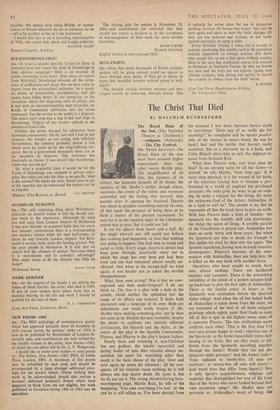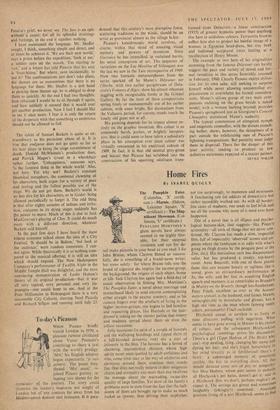The Christ That Died
By MALCOLM
RUTHERFORD
The Royal Hunt of the Sun. (The National Theatre at Chichester.) — endgame. (Aldwych.) — The City Festival.
MR. PETER SHAFFER'S The Royal Hunt of the Sun must have aroused higher expectations than any other recent British play. The magnificence of its title, the vastness of its subject, the immense promise of its theme, the memory of Mr. Shaffer's earlier, though minor, successes, the extent of the talent and resources assembled and the feeling that scarcely nine months after its opening the National Theatre was about to produce something entirely its own, all this made the prospect of being there at its birth a matter of the greatest excitement. To wait for it on the opening night of the Chichester season was to pray that it could not fail.
It ran for almost three hours and a half. By the single interval one still could not believe that nothing had happened, or face that nothing was going to happen. One had seen so much and cared so little. Every single theatrical device had been gone through, practically every use to which the stage has ever been put had been tried and one had remained almost totally un- affected. And when in the second half we tried again, it was harder not to admit the terrible disappointment.
What, then, went wrong? Was it that we over- expected and then under-forgave? I do not think so. The Sun is a play with a hole in the middle, which neither the splendour -nor the range of its effects can conceal. It lacks both characters and a language of its own. Both are deficiencies one could easily forgive if Mr. Shaffer were seeking something else, but he does not seem to be. Despite the epic formality, despite the desire to confront two entirely different civilisations, the Spanish and the Aztec, at the centre of the play is the Spanish Commander, Pizarro, and Pizarro is the play's largest failure.
Poorly born and resenting it, non-Christian but not godless, the wholly successful and daring leader of men who remains always un- satisfied, his quest for something other than death is the basic theme of the play. Over and over again he states his dilemma : all his con- quests, all his victories mean nothing, he is still always one step nearer death. He states it, but we do not see it. The young chivalry-loving hero- worshipping page, Martin Ruiz, he tells at the beginning, 'You own everything I've lost.' At the end he is still telling us, 'I've been cheated from the moment I was born, because there's death in everything.' Does any of us really die for anything?' he complains and he speaks predict- ably of the whores he hasn't loved, the son he hasn't had and the battles that haven't really mattered. But as a character he is a husk, and Colin Blakely plays him at only the slightest re- move from Sergeant Kite.
What does Pizarro seek, and what does he find? In an opening scene he all but faints—`a wound,' he tells Martin, 'from long ago.' It is more than physical; it is the wound of his birth, of his rejection forcing him to become a pro- fessional in a world of ungifted but privileged amateurs. He seeks gold, he seeks to go on seek- ing, he seeks a religion for the living. He seeks the unknown God of the Aztecs, Atahuallpa. Is he a God or isn't he? The answer is no, but he represents all that the Gods have to give on earth. With him Pizarro finds a kind of kinship; the Spaniard has the worldly skill and knowledge, the Aztec the secret of living. A terrible parody of the Crucifixion is played "out. Atahuallpa has been on earth 'thirty and three years,' but when the Spaniards put him to death, his triumph is that unlike his rival he does not rise again. The Spanish expedition, having won so much treasure, disintegrates: Pizarro's treasure, of his com- munion with Atahuallpa, does not help him; he is killed on the way back with another force.
Ourselves, who have sought so much, have seen almost nothing. There are incidental beauties and moments. There is the astonishing unfolding of the petals of a golden octagon high up backstage to give the first sight of Atahuallpa. There is the fearful count of hours as the Spaniards wait motionless before the deserted Aztec village. And when the all but naked body of Atahuallpa is taken down from the stake, we are reminded of the best of all those religious paintings which rightly paint their Gods as men. All of this is epic in the highest sense; none pf it concerns Pizarro. The two civilisations never confront each other. 'This is the first time I've ever seen people happy at work,' observes one of the Spaniards, as the Aztecs beautifully mime their hoeing of the fields. But are they really so dif- ferent from the Spaniards marching together through the Andes? Would they too not dis- integrate under pressure? And the Aztecs' code— 'from eighteen to twenty-five all men are warriors: at twenty-five all men will marry'— how much does that differ from Spain's? Was it only Spain's acquisitiveness, religious and material, that distinguished her way of life from that of the Aztecs who never looked beyond their own mountain range? Mr. Shaffer does not persuade us. Atahuallpa's secret of living, like Pizarro's grief, we never sec. The Sun is an epic without a cause; for all its splendid struttings and frettings, in the end it signifies nothing.
I have mentioned the language. Mr. Shaffer sought, I think, something simple and direct, and at times he achieves it. 'We are their new world,' says a priest before the expedition; 'look at me,' a soldier says on the march, 'I'm starting to rust,' and a whore has told Pizarro that his soul is 'frost-bitten.' But where, save incidentally, to use it? The confrontations just don't take place, the themes are so momentous that there is no language for them. Mr. Shaffer is a dab hand at picking these themes up; he is obliged to drop them as quickly. At the end I had two thoughts; how reluctant I would be to sit through it again, and how unlikely it seemed that it would ever get another production. Now I feel I should like to see it once more. I fear it is only the return of the desperate wish that something so ambitious should not be allowed to fail.
The talent of Samuel Beckett is quite as ex- traordinary as his persistent abuse of it. It is true that endgame does not go quite so far as his later plays in being the stage entombment of death. Donald McWhinnic's production does, and Patrick Magee's tyrant in a wheelchair rather further. 'Unhappiness,' someone says, 'is the funniest thing in the whole world.' Alas, not here. Yet why not? Beckett's constant theatrical metaphors, the continual clowning of his characters, both argue for a variety of pace and feeling and the fullest possible use of the stage. We do not get them. Beckett's world is no less dire for his characters, as in Godot, being allowed periodically to forget it. The odd thing Is that after eighty minutes of tedium and irrita- tion, endgame in its dying stages suddenly has the power to move. Much of this is due to Jack MacGowran's playing of Cloy. It could do much ("lore with a different direction, whatever Beckett said himself.
In the past few days I have heard the most bilious nonsense talked about the idea of a City Festival. `It should be in Bolton,' but look at the audience,' were random comments. I can- not agree. While theatrically it is as nothing com- pared to the musical offering, it is still an idea which should expand. The New Shakespeare Company's performance of Twelfth Night in the Middle Temple Hall was delightful, and the most convincing demonstration of Leslie Hotson's theory of its original production—that it was all very topical, very personal and very im- promptu—one could hope to see. And at the Poor Millionaire in Bisbopsgate there is a very reasonable City Cabaret, starring Noel Picarda and Richard Stilgoe and running until July 25.

























 Previous page
Previous page